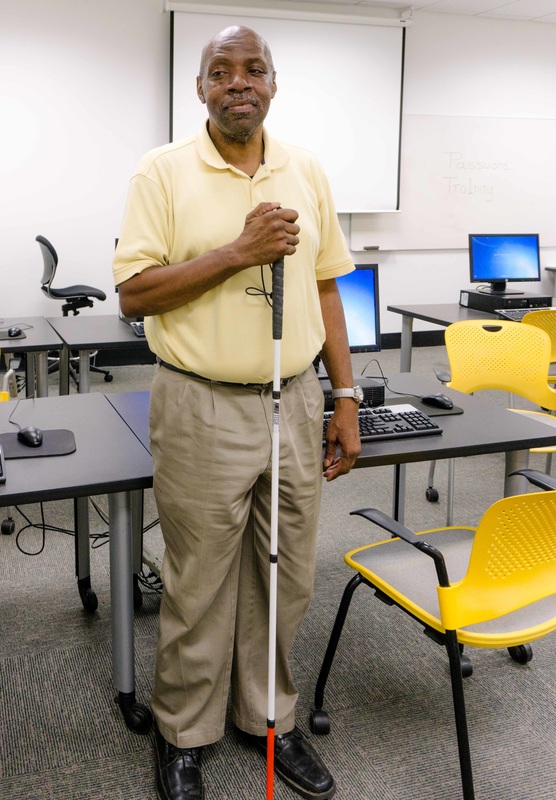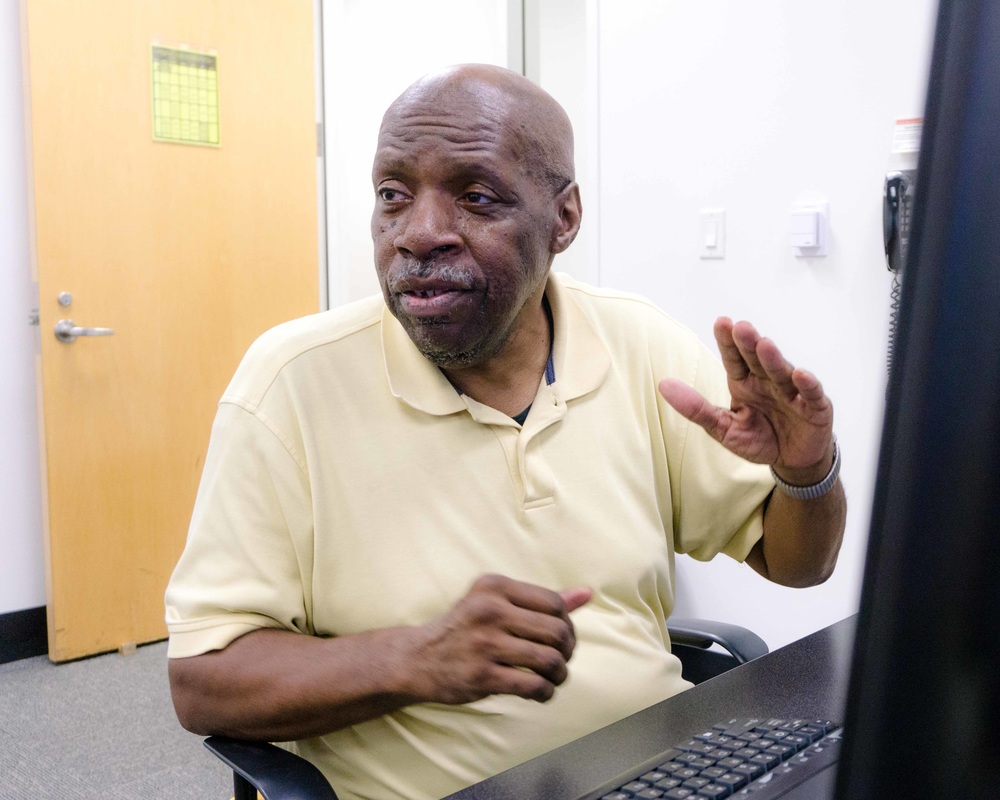"Ten years ago, when I realized I was losing my sight (due to a combination of diabetes and glaucoma), I spent the first 6 months going through the classic depression and anger. The whole nine yards. I got to a point where I said, ‘God, I absolutely cannot deal with this. I’m not going to TRY to deal with this.’ I was contemplating suicide, so one night I went out and bought a total of 5 bottles of over-the-counter meds. I came home, sat down at the table and poured them all out. I was just angry with the world. I didn’t do anything that night, but the next day on the bus ride to the Center for Independent Living, I was still very despondent. A few blocks from my house, the driver stopped to pick up a young girl, and she said, ‘Hey!’ I said ‘Hey’ back, but I wasn’t really paying attention. Then she said to me: ‘You don’t look like you’re having a very good day. Today is my birthday; I’m 13 years old. I’m having a wonderful day!’ And that’s when I actually looked at her. She had very broken and difficult-to-understand speech, the lenses in her glasses were as thick as slices of bread, both her arms were cut off right below the elbow, and both her legs were cut off right below the knees. No arms, no legs, speech problems, in a wheelchair. And I said to myself, ‘My god, you’re sitting here complaining about your sight! How dare you. How freaking dare you complain.’ A few minutes later, we reached the Center, and as soon as I got off the bus, I went straight to the bathroom. I must have been in there 10 minutes, crying like a baby. You know, sometimes we get so focused on what’s NOT right in our lives, we tend to forget about what’s going well. That day I said to myself, ‘I’ll never complain again.’ That was a turning point for me.
“Prior to losing my sight, my professional life had always centered around computers and information technology, but I had to leave that job because I simply could not see to perform it anymore. What was I going to do? I still had a valuable skill set, so I began volunteering every week at the library teaching computer classes to the visually impaired. And I started my own business, the Memphis Technology Lunchbox, also for people with visual impairment. Through the use of assistive technology, adults in my classes learn computer applications that will help them get into the work force and keep up with this digital world. They don't need to be pushed off in a corner and told to just go home, just go sit down. Doesn’t it make more sense for us as a community---in terms of tax base or any other angle---doesn’t it make more sense to say, ‘You know what? Just because you lost your sight doesn’t mean you’ve lost all the talent and the skill you had before.’ Losing your sight doesn’t mean you have to lose your vision. It may take a little longer, the train might move a little bit slower, but what keeps me going every day, what keeps me motivated at 60 years old, is just thinking about the possibilities. Thinking about making a difference.
“Being blind is no picnic---I'm not going to lie to you---but I’m thankful every day. I can honestly tell you I wouldn’t be where I am right now if not for other people helping and encouraging me. It may sound strange, but I’ve actually already written my obituary. The only facts in it are my date of birth and a place to insert date of death. Everything else is a narrative, a thank you to the many people who have made a difference in my life. It doesn’t say anything about my education; it doesn’t mention the Lunch Box, it doesn’t mention my previous business when I had sight, called Byte Size. It doesn’t mention any professional organizations, any awards, or any of the other particulars. It’s just a big ole thank you. That’s all it is. That’s good enough. The other stuff really doesn’t matter.”
“Prior to losing my sight, my professional life had always centered around computers and information technology, but I had to leave that job because I simply could not see to perform it anymore. What was I going to do? I still had a valuable skill set, so I began volunteering every week at the library teaching computer classes to the visually impaired. And I started my own business, the Memphis Technology Lunchbox, also for people with visual impairment. Through the use of assistive technology, adults in my classes learn computer applications that will help them get into the work force and keep up with this digital world. They don't need to be pushed off in a corner and told to just go home, just go sit down. Doesn’t it make more sense for us as a community---in terms of tax base or any other angle---doesn’t it make more sense to say, ‘You know what? Just because you lost your sight doesn’t mean you’ve lost all the talent and the skill you had before.’ Losing your sight doesn’t mean you have to lose your vision. It may take a little longer, the train might move a little bit slower, but what keeps me going every day, what keeps me motivated at 60 years old, is just thinking about the possibilities. Thinking about making a difference.
“Being blind is no picnic---I'm not going to lie to you---but I’m thankful every day. I can honestly tell you I wouldn’t be where I am right now if not for other people helping and encouraging me. It may sound strange, but I’ve actually already written my obituary. The only facts in it are my date of birth and a place to insert date of death. Everything else is a narrative, a thank you to the many people who have made a difference in my life. It doesn’t say anything about my education; it doesn’t mention the Lunch Box, it doesn’t mention my previous business when I had sight, called Byte Size. It doesn’t mention any professional organizations, any awards, or any of the other particulars. It’s just a big ole thank you. That’s all it is. That’s good enough. The other stuff really doesn’t matter.”
"Most libraries have relied on a software called JAWS, which is very expensive. The developer pretty much dominates the market. For someone on a fixed income, that’s a non-starter. We’re using something called NVDA (No-Visual Digital Access). It’s free, and it's on all the computers in this lab. The only major limitation is that it’s currently only Windows-based. Any computer or home laptop can be turned into an assistive technology computer. Big manufacturers won’t tell you about that. NVDA can take you through anything you want to do; it could take you through your doctoral dissertation. You can load it on a flash drive and put it on any Windows computer. It will read the screen to you and allow you to do anything a sighted person can do. NVDA substitutes keyboard commands for the mouse functions. You learn the keyboard shortcuts to do what you want to do. Create, edit, delete, anything. The only difference is that you’re using the mouse and I’m using keyboard commands."
Doug Hall of the Memphis Technology Lunchbox teaches computer classes at the Memphis Public Library, 3030 Poplar Avenue.


 RSS Feed
RSS Feed